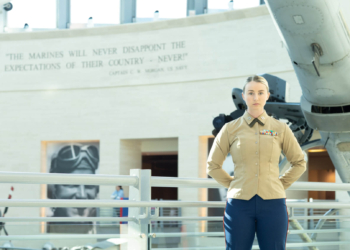The stressors of military life, including geographic separations, deployment and frequent relocation, can wear on a marriage with varying outcomes. Spouses say seeking assistance early and developing an individual sense of identity can help fortify relationships.

For Lisa Hylton, a Coast Guard wife, there was a host of factors that shaped the trajectory of her marriage. She was married at 21, right after her husband completed boot camp, feeling the pressure to commit or split; he was given orders on a cutter and would be at sea for several months at a time.
During that time, Hylton was living at home with her parents in Jacksonville, Florida, and working on a college degree. When her husband completed his first assignment, she quit school and moved with him to Elizabeth City, North Carolina.
“That put a really big problem in our marriage and I started resenting him. … We got married so quick — we never really experienced adult life until we were in our marriage, away from everyone with little support,” she said.
They separated two years later but decided to stay legally married because it gave them important benefits, like healthcare, plus her strong credit score put him in a better situation.
All the while, they continued living separate lives and pursuing their goals. Hylton completed her degree and established a stronger sense of identity. She and her husband would see each other when he came back home to visit and they maintained a friendship. After two years of separation, they decided to become a couple again. The space they gave each other to grow as individuals was essential for their marriage.
Hylton explains that, in the early years of their marriage, “I resented [my husband] because I felt like I was forced to give up my life to follow him around. And then after I started my career and doing what made me happy, we were kind of working together toward common goals, he supported me, I supported him, instead of me just giving up everything, it made me happier and ultimately made us happier.”
Navy veteran Tara Glenn met her first husband in Pensacola, Florida, while she was in A-school and he was working at the pharmacy.
When she transferred elsewhere, they kept in touch and developed a relationship. After they married in November of 2011, Glenn transitioned to the reserves and moved to Pensacola to be with him.
He deployed and they had a child, but things turned sour when her husband volunteered for an assignment in Albany, Georgia. Glenn was unhappy and could not find satisfying work. She felt resentment towards him, which caused him to be angry in return. They found themselves in a marriage riddled with conflict and unrest.
In 2017, she asked for a divorce.
 Glenn spent a lot of time reflecting on their marriage to learn more about herself and to identify ways she had contributed to their problems. She committed to treating her ex-husband with greater kindness and their relationship improved. Both are now remarried and they are successfully co-parenting their two biological children. It has worked well for them because both of their new spouses are involved and supportive of the way that she and her ex-husband want to raise their kids.
Glenn spent a lot of time reflecting on their marriage to learn more about herself and to identify ways she had contributed to their problems. She committed to treating her ex-husband with greater kindness and their relationship improved. Both are now remarried and they are successfully co-parenting their two biological children. It has worked well for them because both of their new spouses are involved and supportive of the way that she and her ex-husband want to raise their kids.
Glenn adds that she and her ex-husband never considered seeking outside support while struggling in their marriage because they didn’t know of any resources available to them.
The Department of Defense provides free non-medical counseling for military families through Military OneSource and Military and Family Life Counseling. Military OneSource offers round-the-clock services through the call center and website, while the MFLC program provides services face-to-face in the community. These programs offer flexibility in terms of access and confidentiality. Because the services involve non-medical counseling, use is not documented in a service member’s health record. In addition, the various modalities of access give service members and their families a great deal of privacy.
Lee Kelley, director of Military Community Support Programs, recognizes that seeking help is difficult.
“Universally speaking, it’s hard for any one of us to acknowledge a problem in a relationship … we wait until it escalates and becomes a more significant issue. My greatest recommendation for any relationship experiencing challenges is to head it off at the beginning. Ask for help early. Ask for help often,” she said.
For families who are not yet ready to seek external intervention, Military OneSource offers several resources. The first is a self-help tool called Love Every Day, which uses text prompts for 21 days to encourage people in a relationship to reflect on their partnership. There is also specialty consultation through Building Healthy Relationships, a curriculum designed to focus on communication skills that can be conducted through video chat or by phone.
Hylton advises anyone struggling in a marriage to “get counseling. Talk to someone. If I had found out what the root problem was in our marriage, we probably wouldn’t have had so much heartbreak. … I didn’t talk to anyone and I wish I did.”
Glenn echoes this same sentiment, urging others to “seek out help early before things get really bad. If you don’t, you might not want help when you finally can get it.”
Read comments







































